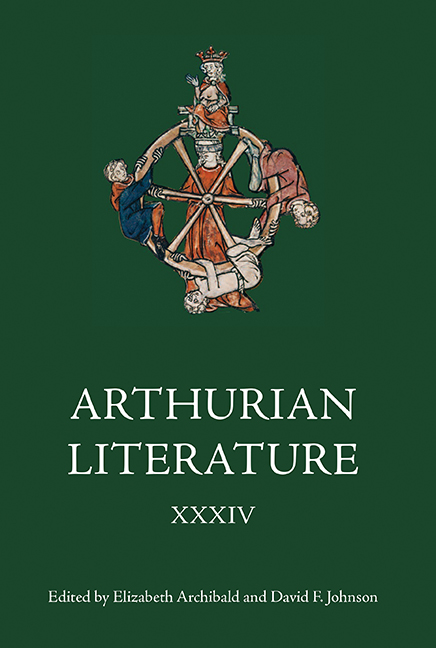Book contents
- Frontmatter
- Contents
- List of Illustrations
- General Editors’ Foreword
- List of Contributors
- I Illusory Ends in Chrétien de Troyes’ Erec et Enide
- II Who is the Traitor at the Beginning of Sir Gawain and the Green Knight?
- III Sir Gawain's Death and Prophecy in Malory's Morte Darthur
- IV Late Medieval Irish Kingship, Egerton 1782, and the Irish Arthurian Romance Eachtra an Mhadra Mhaoil (‘The Story of the Crop-Eared Dog’)
- V ‘Which I have beholden with most curiouse eyes’: The Lead Cross from Glastonbury abbey
- VI The Arundel Coronatio Arthuri: A Middle English Sword in the Stone Story from London, College of Arms MS Arundel 58
- Arundel Coronacio Arthuri
- Appendix I Linguistic Profile For Aca
- Appendix II Select Glossary
- Contents of Previous Volumes
III - Sir Gawain's Death and Prophecy in Malory's Morte Darthur
Published online by Cambridge University Press: 17 July 2019
- Frontmatter
- Contents
- List of Illustrations
- General Editors’ Foreword
- List of Contributors
- I Illusory Ends in Chrétien de Troyes’ Erec et Enide
- II Who is the Traitor at the Beginning of Sir Gawain and the Green Knight?
- III Sir Gawain's Death and Prophecy in Malory's Morte Darthur
- IV Late Medieval Irish Kingship, Egerton 1782, and the Irish Arthurian Romance Eachtra an Mhadra Mhaoil (‘The Story of the Crop-Eared Dog’)
- V ‘Which I have beholden with most curiouse eyes’: The Lead Cross from Glastonbury abbey
- VI The Arundel Coronatio Arthuri: A Middle English Sword in the Stone Story from London, College of Arms MS Arundel 58
- Arundel Coronacio Arthuri
- Appendix I Linguistic Profile For Aca
- Appendix II Select Glossary
- Contents of Previous Volumes
Summary
On his deathbed, Malory's Sir Gawain writes to Lancelot ‘but two owrys and a halff afore my dethe’. How does Gawain know when he will die, and what are the implications of this knowledge? The deathbed scene occurs shortly before Arthur has an apparently prophetic dream about Gawain. For many readers, Gawain's accurate prediction of the hour of his death reinforces the sense that the dream is prophetic. Broadly speaking, to accept both episodes as prophetic corresponds to assigning the Morte Darthur to the genre of romance, and to seeing Malory as invested in romance values.
The conjunction of Gawain's death and Arthur's dream appears to be a neat example of Malory's paratactic construction on the narrative level, as elucidated by Bonnie Wheeler, in this case to reinforce Gawain's authority as a prophet. Closer attention to Gawain's apparent foreknowledge, however, complicates interpretation of both the deathbed and the dream. I argue that common sense, rather than a sudden prophetic gift, tells Gawain that he will expire at noon, and that the absence of supernatural elements in the deathbed scene should prompt reconsideration of Arthur's dream: it reflects Arthur's anxieties, rather than being truly prophetic. I concur with critics such as Wheeler and Whetter that Malory's Gawain is a more consistent (and virtuous) character than some scholars give him credit for being. His virtues, however, are secular and pragmatic rather than spiritual. That his final appearances in Malory correspond to his earlier character development, rather than introducing an unexpected supernatural side to Gawain, supports the case for consistency in Gawain's character. This sceptical view of Gawain's predictions on his deathbed and in Arthur's dream corresponds to a view of Malory as a writer for whom romance is mingled with realism derived from his own experiences with battlefields and politics.
Despite its pathos, Gawain's death receives only glancing references in the critical literature, crowded out by all the other ironies and tragedies of Malory's final book. On the timing of Gawain's death, Vinaver himself observes only that ‘Gawain's foreknowledge is taken for granted’, while other critics comment on the way Gawain's short remaining span of life increases the sense of tragedy, and on the irony of Gawain's last hours being those in which he normally was strongest.
- Type
- Chapter
- Information
- Arthurian Literature , pp. 52 - 68Publisher: Boydell & BrewerPrint publication year: 2018



